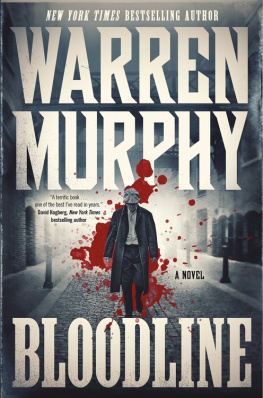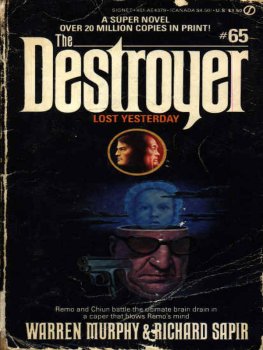Destroyer 129: Father to Son
By Warren Murphy and Richard Sapir
PROLOGUE
She was called Sonmi.
No one in the village knew much about her. She was from one of the older families, but since none had moved into the village in many generations, they were all members of the older families by now.
Her mother had died giving birth to her more than seventy years ago. Her father had died only recently. Some said the old man was a powerful shaman. All in the village stayed away from him and his daughter. When he died, only Sonmi wept.
On this day, as the cold sun peeked above the eastern horizon, old Sonmi picked her careful way down the rocky shore. A small fishing boat of fine Egyptian cedar was tied to a wood post. Sonmi unhooked the rope and climbed aboard.
It took a long time to row. Her withered arms were sore by the time she made it far enough out into the bay.
From a pouch on the belt of her coarse dress she produced some blessed herbs. She scattered them upon the black water, reciting the mystical chants passed down to her from her father and his father before him, all the way back to before the time of the Forgotten One.
Once she was done, she stood at the edge of the wobbling boat and jumped overboard. The cold waters of the West Korean Bay accepted her body with barely a splash.
Beyond the empty boat, across the bay and up the rocky shore, the village of Sinanju where the dead woman Somni had lived all her life, stirred awake. The sun rose.
The boat bobbed on the gentle waves.
In time an elderly fisherman noticed the boat out in the bay and sent his son out to retrieve it.
Days passed. No one thought much of old Sonmi. Eventually someone noticed she was gone. None knew where. No one looked for her. No one cared.
The few thoughts people had soon faded and the old woman disappeared from memory.
As if she had never existed.
Chapter 1
The water was warm, but not from the sun.
The sun never warmed the waters of the West Korean Bay. Summer or winter, it was always the same. Cold. Like the emptiest heart or the farthest point in the bleak night sky.
But that one spot, way out in the middle of the bay-only as wide across as a man's arms could stretch-was warm. And though cold waves lapped all around, it remained warm within. No one knew why.
It was a new occurrence. Everyone was certain of that. The village of Sinanju had been founded on that barren shore more than five thousand years before. In all that time there was no record, written or oral, to indicate that the warm spot in the water had been there at any time in history.
It was dark, too. Like blood.
The spot had been warm for more than a year. Even though Sinanju would have been dismissed by most as a typical rural Korean fishing village, few fishermen actually lived there. Those who fished were mostly old men who kept up the tradition, coming to it later in life.
The healthy young men who should have been fishermen-would have been if Sinanju were like any other poverty-stricken village on the inhospitable coast of North Korea-did not toil in boats with nets until their hands became tired knots of arthritic bone. They sat in the village, fat and lazy, living off the sweat of another man's brow. Some day, when they grew old, some of them would take to fishing out of boredom, out of some need to connect to their past.
But for now, the young were young, the old were old and it was the old who fished. Sometimes. When the men who fished first found the warm spot in the water, they tried to cast their nets in it. Maybe it was a gift from the gods. Maybe that warm spot was put there to draw in the fish, for in truth the fishing in the bay was generally poor and the catch was always meager.
The nets came up empty.
Time after time they tried, always with the same results. The area was dead to life.
In the summer a few young men tried to swim down to see if there was something on the bottom that was making the spot warm. But the water was too deep and the undertow too strong. They gave up and swam back to the surface.
After that the area was left alone. The old men cursed and spit upon the waves even as they rowed wide around the spot. All avoided the evil warm blot, which, as time went on, grew more and more like the color of human blood.
The spot was there for many months. Then one night it vanished.
The supernatural stain on the waves was erased, consumed by cold and tide.
Not a soul was there to see.
When it happened, the village of Sinanju was asleep.
The rock walls of the bay were a black void, swallowed by the moonless sky. A jagged lip of stone formed the line between earth and air. Stretching up before the twinkling stars was a pair of upthrust basalt rocks. The artificial rock formation formed a pair of horns.
The white starlight cast the inky shadow of the horns across the bay. They rolled up and down across the waves like a pair of pinching black fingers. Far out, between the most distant, curving points of rock, they framed the spot where the water had been warm but had suddenly grown very, very cold.
In the hour after midnight there came a flash. It was brilliant, white. The white flash was the flash of a meteor. But it came from sea, not sky. From the dark depths of the bay. A bright pop of something otherworldly from beneath the waves.
No one saw it. Sinanju slept.
The water grew hot once more. Then boiling.
The air was cold. Steam rose white over the icy bay, rolling into shore like sweet-smelling fog.
The water churned. Hotter than blood. A swirling, frothy red foam bubbled to the surface.
The waves stained the shore red.
Three hours after midnight, something screamed. A single cry, like the shock of birth.
And as the swirling water leveled off, a hand rose through the foam, fingers clutching.
Then came another hand.
All at once, a face broke the cold surface, the gulping mouth gasping for air.
The hair was black and clung to the scalp. Streaks of blood ran down, framing the face. The face of a dead man.
The pain was too great.
With feeble kicks, the figure rolled over onto his back.
He floated there for a long time as the warmth dissipated and the water cooled around him. Hazel eyes stared up at the cold, thankless sky. It had been many years since those eyes had glimpsed the sky.
For a long time, the man just lay there, naked and alive. When the cold began to sting like life, he rolled over. Testing reborn limbs, he began swimming for shore.
For Sinanju. For home.
Chapter 2
His name was Remo and he could feel a thousand sets of eyes following his every move even though he was alone.
When the sensation first manifested itself all those months ago, he hadn't known what it was. For Remo Williams, the not knowing had been a frightening thing.
Remo was a Master of Sinanju, the most ancient and deadly of all the martial arts. The other, lesser martial arts were but splintered rays. Sinanju was the sun source.
The very hum of life was white noise to most people. Their senses were dead to the world around them. As a Master of Sinanju, Remo was trained to the pinnacle of human perfection. His environment was alive. He was able to see and sense things the rest of the world tuned out.
One of the things Remo was able to detect were the telltale signs that signalled to him he was being watched. As a professional assassin, this honed sense was oftentimes the difference between life and death. The ability was as much a part of him as hands or eyes or breath itself. And so when he'd gotten up that morning almost a year ago and felt an audience crammed into his small bedroom alongside his sleeping mat, he thought his senses were going screwy. There was no one else with him. He was certain of it. No heartbeats, no nothing. He was alone. Yet not alone.
Next page



